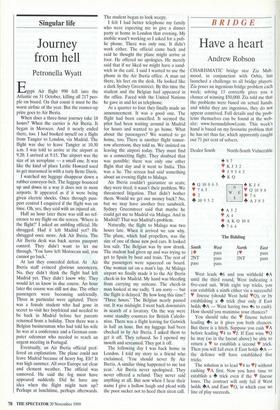Singular life
Journey from hell
Petronella Wyatt
Egypt Air flight 990 fell into the Atlantic on 31 October, killing all 217 peo- ple on board. On that count it must be the worst airline of the year. But the runner-up prize goes to Air Iberia.
When does a three-hour journey take 18 hours? When the carrier is Air Iberia. It began in Morocco. And it nearly ended there, too. I had booked myself on a flight from Tangier to London, via Madrid. The flight was due to leave Tangier at 10.30 a.m. I was told to arrive at the airport at 9.20. I arrived at 9.15. The airport was the size of an aeroplane — a small one. It was like the kind of place Leslie Howard used to get marooned in with a tarty Bette Davis.
I watched my luggage disappear down a rubber conveyor-belt. The luggage bounced up and down in a way it does not in most airports. It appeared as if it were being given electric shocks. Once through pass- port control I enquired if the flight was on time. Oh, yes, they said with an injured air.
Half an hour later there was still no ref- erence to my flight on the screen. 'Where is the flight?' I asked an ambling official. He shrugged. Had it left Madrid yet? He shrugged once more. Ask Air Iberia. The Air Iberia desk was back across passport control. They didn't want to let me through. 'You have left Moroccan soil, you cannot go back.'
At last they conceded defeat. At Air Iberia staff evinced glorious unconcern. No, they didn't think the flight had left Madrid yet. They didn't know why. They would let us know in due course. An hour later the course was still not due. The other passengers were becoming unfriendly. Three in particular were agitated. There was a female student who had gone in secret to visit her boyfriend and needed to be back in Madrid before her parents returned from a holiday. Then there was a Belgian businessman who had told his wife he was at a conference and a German com- puter salesman who needed to reach an urgent meeting in Portugal.
Eventually, an Air Iberia official prof- fered an explanation. The plane could not leave Madrid because of heavy fog. Eh? It was high summer. All over Europe sat clear and clement weather. The official was unmoved. He said the fog must have appeared suddenly. Did he have any idea when the flight might turn up? Perhaps at lunchtime, perhaps afterwards. The student began to look weepy.
I felt I had better telephone my family who were expecting me to give a dinner party at home in London that evening. My mobile wasn't working so I asked for a pub- lic phone. There was only one. It didn't work either. The official came back and said he thought the plane might arrive at four. He offered no apologies. He merely said that if we liked we might have a sand- wich in the cafe. I said I wanted to use the phone in the Air Iberia office. A man sat there, his feet on the desk. He looked like a dark Sydney Greenstreet. By this time the student and the Belgian had appeared in the office. Faced with the United Nations he gave in and let us telephone.
At a quarter to four they finally made an announcement. It was a good one. The flight had been cancelled. It seemed the pilot had been waiting around in Madrid for hours and wanted to go home. What about the passengers? We wanted to go home, too. There is another flight tomor- row afternoon, they told us. We insisted on leaving the airport today. They must find us a connecting flight. They doubted that was possible; there was only one other flight that day and it went to India. This was a lie. The screen had said something about an evening flight to Malaga.
Air Iberia couldn't guarantee us seats; they were tired; it wasn't their problem. We threatened litigation. That didn't bother them. Would we get our money back? No, but we may have another free sandwich. Sydney Greenstreet said that maybe he could get me to Madrid via Malaga. And in Madrid? That was Madrid's problem.
Naturally, the flight to Malaga was two hours late. When it arrived we saw why. The plane, which had propellers, was the size of one of those new pod cars. It looked less safe. The Belgian was by now drunk. The student had given up and was trying to get to Spain by boat and train. The rest of the passengers were squeezed on board. One woman sat on a man's lap. At Malaga airport we finally made it to the Air Iberia check-in for Madrid. My hand was bleeding from carrying my suitcase. The check-in man looked at me sadly. 'I am sorry — but the flight is delayed.' By how long this time? 'Three hours.' The Belgian nearly passed out. It was midnight. I went back downstairs in search of a lavatory. On the way were some standby counters for British Caledo- nian. There was a flight leaving for Gatwick in half an hour. But my luggage had been checked in by Air Iberia. I asked them to get it off. They refused. So I opened my mouth and screamed. They got it off.
The following day I was back home in London. I told my story to a friend who exclaimed, 'You should never fly Air Iberia. A similar thing happened to me last year.' Air Iberia never apologised. They never offered a refund. They never said anything at all. But now when I hear their name I give a hollow laugh and plead with the poor sucker not to heed their siren call.


























































































 Previous page
Previous page